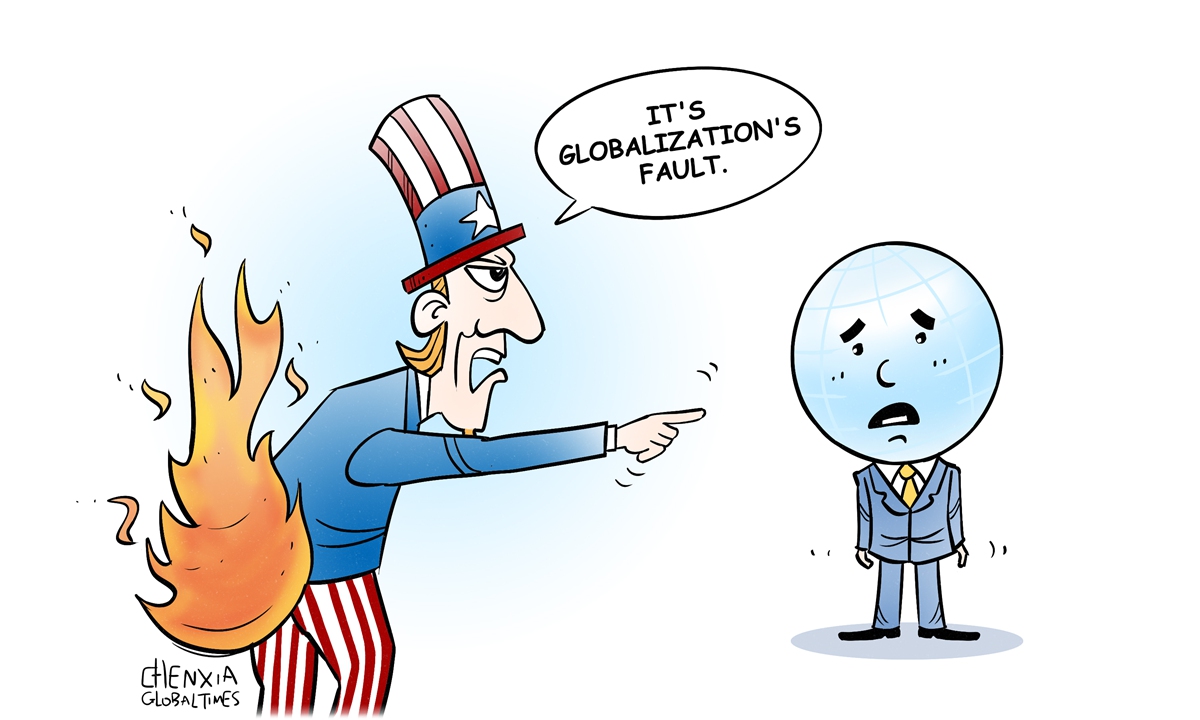
Illustration: Chen Xia/Global Times
For a prolonged period of time, US politicians have been attributing a range of the country's social problems, such as deindustrialization, job loss, class inequality and even obesity and drug addiction, to free trade and globalization.
The growing suspicion toward economic interdependence, cultural diversity and social connectivity - all key aspects of globalization - has led the US government to become more protectionist and reject multinational free trade deals. It has started to embrace a narrative that globalization has been economically detrimental to America.
China, a staunch advocate and influential force for economic connectivity and globalization, inevitably draws most of the acrimony, as American politicians and pundits of all stripes blame the country for their own domestic issues. They deny globalization can create new connections by breaking down boundaries between people, which can lead to closer international cooperation and understanding. However, the fact is that most of the negative things that have happened in the US in recent years have little to do with globalization. Instead, they are the result of poor policymaking in Washington.
Globalization is actually a symptom of the human desire and ambition to aspire for closer connections. This desire leads to ever-increasing exchanges in trade, investment, cultures and ideas, which in turn create more opportunities and bring broader prosperity, benefiting a larger portion of the world's populace.
Since 1978, China has fully embraced reform, opening-up and globalization. The country has warmly welcomed foreign investment and embarked on its signature Belt and Road Initiative nearly 11 years ago. This iconic project of globalization helps connect more economies and peoples through infrastructure, broadband and ideas, creating numerous opportunities.
It is true that globalization has benefited many developing economies, including China, but the nation's spectacular long-term growth largely stems from the country's systematic institutional restructuring and market-oriented reforms, combined with massive investment in infrastructure, education, scientific research and technological innovation.
Of course, fairly open access to global markets has also facilitated the process of China's rapid modernization, but the key has been wisely choreographed plans of institutional reforms and clearly targeted investments to embrace globalization. China's impressive rise in GDP is primarily based on its willingness to "go global" by instituting systemic reforms and making huge investments in crucial industrial and technological fields.
In comparison, the US' so-called wounds of globalization are mostly self-inflicted. For instance, its swing toward deindustrialization has resulted from bad policymaking. The US government actively expanded the financial sector during the 1980s and 1990s while recklessly easing regulations, causing the 2008-09 financial system meltdown.
At the same time, the US government placed focus on developing high-tech service platforms, causing a wave of industrial hollowing-out. Large internet-based companies that had preferential access to capital, talent and government incentives drove many local US companies out of business in the early 2000s. Meanwhile, the US federal government almost completely stopped enforcing antitrust laws, allowing monopolistic firms to buy out competitors or use predatory pricing regimes to defeat them - giving rise to media-concocted stories of middle-class Americans being left behind and swept over by the tide of globalization.
Over the past 30 years, the US has turned over much of its economy to a few huge politically-connected banks, insurers, oil companies and tech giants, placing a large proportion of the economy at the disposal of the monopolistic or oligopolistic companies. As a result, inequality has risen, leaving middle-class families feeling increasingly alienated and impoverished.
Now, average American families are burdened by the soaring costs of healthcare and education, which can be attributed to an unaccountable system of public-private quasi-monopolistic institutions that lack the incentive to control expenses. For example, the student loan program, created in the late 1970s, probably was intended to help university students, but its real effect has been to create a massive pool of money that could be grabbed by universities, allowing them to get huge increases in tuition costs and leading to the current crisis of indebtedness of many young Americans.
Additionally, automation has played a role in job losses in the US and other places. Americans are hounded by the psychological letdown as they feel disgruntled for failing to live a better-off life than their parents. That frustration is real, though American politicians grossly overstate this diagnosis by blaming international trade and globalization. For every one US job lost through international trade from 1980 to 2016, researchers conclude that about four jobs have been lost because of automation, robotics, and other productivity boosters.
US politicians, to varying degrees, have espoused protectionist and nationalist mentality by publicly displaying skepticism and hostility toward free trade and globalization. This has influenced a growing number of Americans to adopt an anti-globalization stance. And, algorithms for social media sites help steer users toward news sources and trending hash-tag opinions that promote "ills of globalization." These algorithms also contribute to the polarization of American society by segregating the public into different camps.
The truth is globalization has brought many benefits to the world. It promotes healthy market competition and allows businesses to achieve economies of scale. It allows producers to specialize and optimize production. Globalization has made significant contributions to the development of the world economy over the past few decades.
In summary, America's problems are caused by its own narcissism, which stems from its political systems and the country's unwillingness to invest in its own future. The key lesson from the past few decades is that globalization presents an opportunity, but this opportunity is only accessible to countries that are willing to make the necessary institutional reforms to improve efficiency through fair and open market competition.
The author is an editor with the Global Times.
bizopinion@globaltimes.com.cn




